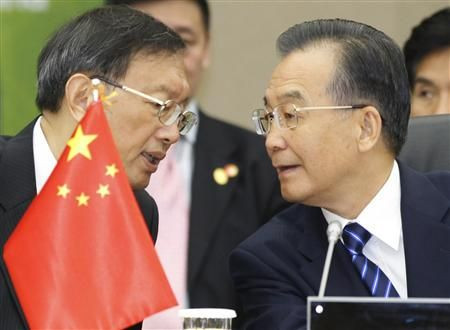China Under Increasing Pressure Not to Deport North Korean Defectors
ANALYSIS

When Chinese foreign minister Yang Jiechi visits South Korea on Thursday, he will have a full plate of issues to discuss, principally North Korea.
Chinese officials will likely deliberate over the ramifications of North Korea’s decision to halt its uranium enrichment program in exchange for food aid from the United States -- a development cautiously welcomed by the U.S. State Department, South Korea and Japan.
However, there is another crucial and difficult subject that will definitely be on the agenda in Seoul -- the plight of thousands of North Korean refugees who cross into China illegally and are summarily returned to their native country to face misery, suffering, imprisonment and even death.
South Korea and certain western nations have been pressuring Beijing not to deport the North Korean defectors -- it is a sensitive topic for the Chinese.
The U.S. State Department reportedly suggested to senior Chinese officials that Beijing should not repatriate North Koreans back to their home country and that such acts may breach international treaties on refugees that China has already signed.
The Obama administration reportedly is watching closely for Beijing’s response to its requests.
According to South Korea’s Yonhap news agency, a U.S. congressional panel plans to hold an emergency hearing on Beijing’s policy on North Korean refugees next week.
Despite its obligations under international law, the Chinese government maintains an agreement with North Korea to repatriate North Korean refugees, the Congressional Executive Commission on China stated on its website.
In recent weeks, international human rights advocates and organizations have called on the Chinese government not to repatriate dozens of North Korean refugees currently detained in China.
The Commission added that the hearing will address the current predicament of North Korean refugees who have been detained by Chinese authorities in recent weeks.
The controversy promises to cause some uncomfortable moments between Yang and his Seoul counterpart, South Korean foreign minister Kim Sung-hwan.
Already, ahead of Yang’s scheduled state visit to Seoul, China is asking the South Koreans not to make a big issue of the North Korean defectors.
According to Korean media, China’s foreign ministry sent a message to its Seoul counterparts “not to shift the issue of North Korean defectors [in China] into an international matter.”
A spokesman for the Beijing ministry, Hong Lei, said during a briefing: “China is opposed to shifting the issue of North Korean defectors into a refugee matter and internationalizing and politicizing it.”
Earlier this week, Hong said: They [North Korean refugees] entered China illegally for economic reasons. There lacks enough grounds to define them as refugees.
In response, a South Korean official stated last weekend: “China is apparently feeling the heat over its deportation of North Korean defectors evolving into an international issue.”
However, it may be too late for the topic not becoming a global issue.
Anti-Chinese demonstrations protesting the deportation of North Korean defectors have sprouted in both Washington and Seoul, as well as some other cities.
The President of South Korea Lee Myung-bak has long condemned China’s deportation of North Korean citizens and has vowed he may bring up the problems before the UN’s Human Rights Council.
A report in the Korea Herald newspaper stated that the European Union (EU) may also get involved and pressure China on the subject of refugees.
“Germany and the EU shared [the] view that forced repatriation of North Korean refugees was not desirable. They said they would seek active cooperative measures,” an anonymous source told the paper.
Robert Park, a Korean-American missionary and human rights activities, wrote an opinion piece for the San Jose Mercury News of California in which he spelled out the dangers faced by North Korean nationals who are repatriated back by China.
“China continues to hunt down and forcibly repatriate refugees to North Korea, where they are brutally tortured and either executed or imprisoned in hellish concentration camps,” he wrote.
“Babies of repatriated North Korean women are killed through forced abortions and infanticide for being part Chinese, a practice clearly violating the U.N. Genocide Convention. China returns more than 5,000 North Korean refugees every year; tens of thousands of innocent people have been killed and innumerable families torn apart as a direct consequence of China's unjustifiable policy.”
Park added that 60 to 70 percent of the North Korean refugees in China are women, 70 to 80 percent of whom victims of sex trafficking.
“Their children conceived through rape are considered stateless in China and are vulnerable to trafficking and abandonment,: he noted.
“Furthermore, innumerable children who escaped from North Korea with their parents have become orphans because one or both of their parents were found by Chinese officials. These children also usually end up homeless or become victims of exploitation.”
© Copyright IBTimes 2024. All rights reserved.





















